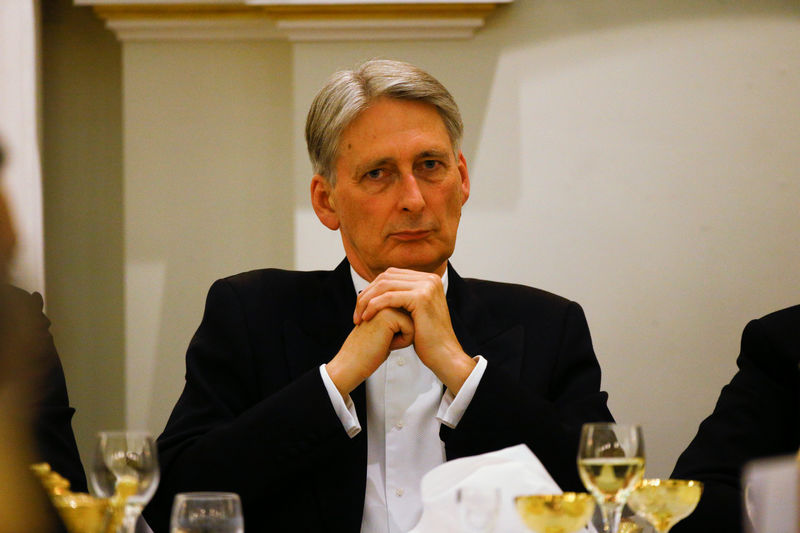By David Milliken and Andrew MacAskill
LONDON (Reuters) - The Treasury is not trying to undermine Brexit but is instead focused on boosting prosperity by promoting continued close ties with the European Union after the country leaves, Chancellor Philip Hammond said on Thursday.
Hammond is widely viewed as the most pro-EU of Prime Minister Theresa May's senior ministers, and earlier this month Foreign Secretary Boris Johnson described the finance ministry as "basically the heart of Remain".
In a major speech to London's financial services industry, Hammond said his priority was preserving existing business and trade ties after Brexit, as well as seeking new global financial services deals with non-EU countries.
"That does not make the Treasury, on my watch, 'the enemy of Brexit'. Rather, it makes it the champion of prosperity for the British people outside the EU, but working and trading closely with it," he said in his annual speech at the Mansion House in the City of London, Europe's biggest financial centre.
The event is one of the major set pieces of the year for both Hammond and Bank of England Governor Mark Carney, who also spoke. It comes a day after May won a vote in parliament on her Brexit plans, facing down rebels within her ruling Conservative Party who favour closer ties with the EU.
Britain will leave the EU in March next year, but a transitional trade agreement has not been finalised and there are disagreements among May's top team over how much effort to put into maintaining close ties with the EU.
MUTUAL RECOGNITION?
Financial services are one of the thorniest issues facing Brexit negotiators.
Hammond defended a model he set out in March, under which Britain and the EU would allow cross-border trade in financial services on the condition that each side preserves regulatory standards in line with the best international standards. This model would be maintained by close co-operation between regulators.
But financial executives told Reuters last week they no longer believed it was realistic in the face of scepticism from the EU.
Carney said that he thought a deal involving close regulatory cooperation "remains both feasible and in the interests of the UK, Europe and the world".
By contrast, the EU's starting point is that Britain is entitled to no more than the basic 'equivalence' access given to non-EU countries after it leaves.
Even a so-called 'enhanced' version of this looked unsatisfactory, Hammond said. "Although I have heard talk of 'enhanced equivalence', I have not yet seen a credible proposal for what it might mean or a clear articulation of how it might work," he said. "As of today, the most developed model ... is the one I set out in March."
GLOBAL PARTNERSHIPS
Hammond said that after Brexit, he wanted London to be the world's "undisputed gateway to financial markets" and to strike fresh global financial partnerships, based on new free trade deals and existing dialogue with countries such as China and India.
Responding to Hammond's comments, trade body CityUK welcomed steps he announced to boost skills training but said it also wanted easy access for staff from outside Britain, both before and after Brexit.
Hammond also confirmed taxpayers would need to "contribute a bit more in a fair and balanced way" towards a 20 billion-pound boost to the National Health Service announced earlier this week by May.

A 'Brexit dividend' after Britain ceases paying EU membership dues would fund only part of the cost, and the government had no intention of abandoning plans to lower Britain's public debt, he added. Last year the government budget watchdog forecast Brexit would be a net drain on Britain's public finances.